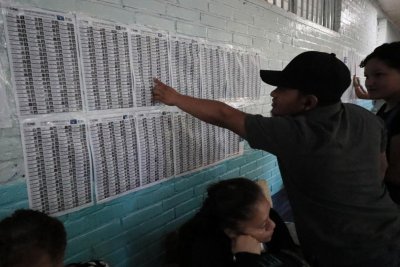A man looks for his polling place during election day in Tegucigalpa, Honduras, in March. Primary and internal elections in Honduras began March 9 to choose the candidates for president, mayors and deputies for the general elections November 30. File Photo by Gustavo Amador/EPA
Aug. 8 (UPI) — Less than three months before general elections, Honduras’ National Electoral Council, or CNE, faces unprecedented political, judicial and technical pressures that threaten to derail the process.
The council’s ability to ensure an orderly and reliable election has been called into question after a series of setbacks: a raid on its offices by the Public Ministry, delays in contracting the Preliminary Electoral Results Transmission System, or TREP, and errors in the voter registry.
CNE President Cossette López has denounced persistent interference and threats, while council member Ana Paola Hall submitted a conditional resignation over internal disputes.
Amid the crisis, the CNE reached an agreement Thursday after a two-week delay, resolving one of the main technical disputes — use of the TREP.
After intense negotiations, the CNE unanimously agreed to immediately and fully publish all tally sheets from the vote receiving boards on election night, followed the next day by a 100% visual verification in the presence of national and international observers.
This week, the National Democratic Institute’s Electoral Study and Accompaniment Mission visited Honduras. On Friday, it released a report warning about the negative impact of judicial intervention and interference by other institutions in electoral work, as well as the use of hate speech and attacks against journalists, social leaders and politicians — particularly those targeting politically active women, including CNE members and candidates at all levels of office.
The NDI identified five key challenges to ensuring election integrity: effective autonomy of electoral bodies, prevention of undue interference, reduction of polarization and premature fraud claims, prevention of electoral violence and easing tensions that affect civic space.
Among its recommendations, the NDI urged ensuring the independent participation of civil society and creating safe spaces for dialogue. It said Hondurans deserve credible, peaceful and inclusive elections, which require political, institutional and technical conditions that guarantee certainty, transparency and respect for the will of the voters.
In a politically symbolic move, four of Honduras’ five leading presidential candidates signed a pact Tuesday, Aug. 4, titled “Honduras First: A Promise That Is Demanded, a Duty That Is Fulfilled,” promoted by the National Anti-Corruption Council.
The public pledge — focused on fighting corruption and impunity and promoting integrity in governance — calls for, among other measures, creating an international commission against corruption and impunity, reactivating the extradition treaty with the United States, establishing a national public integrity system and implementing a nationwide transparency and anti-corruption strategy with an interagency approach.
Signatories included Salvador Nasralla of the Liberal Party, Nasry Asfura of the National Party, Mario Rivera of the Christian Democratic Party and Nelson Ávila of PINU-SD. Rixi Moncada, the ruling party’s candidate and former finance minister under President Xiomara Castro, did not attend the signing.
